|
|
|
Sort Order |
|
|
|
Items / Page
|
|
|
|
|
|
|
| Srl | Item |
| 1 |
ID:
078538


|
|
|
|
|
| Publication |
2007.
|
| Summary/Abstract |
This paper seeks to analyze the potential for violent conflict in the Republic of Vanuatu, a small island state in the South West Pacific. It examines the likelihood of state level conflict and investigates local factors which might contribute to state destabilization. It seeks to redress the relative absence of Pacific conflicts from the international discourse on conflict and conflict prevention.
We argue that while Vanuatu possesses indicators of potential conflict, when violent conflicts have arisen in Vanuatu they have remained small scale and rapidly contained. In exploring this phenomenon, the paper charts factors such as formal and informal dispute resolution mechanisms, ethnic diversity, the availability of small arms and the incidence of violent crime. However, we note that strategies aimed at preventing the outbreak of violence may potentially create policy conflicts with other areas. In particular, we look at the effects of indigenous dispute resolution strategies on gender empowerment, one of the United Nation's Millennium Development Goals and a central premise of Australian Official Development Assistance to Vanuatu
|
|
|
|
|
|
|
|
|
|
|
|
|
|
|
|
| 2 |
ID:
156756
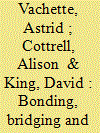

|
|
|
|
|
| Summary/Abstract |
Cyclone Pam (March 2015) was an unprecedented event in Vanuatu forcing the simultaneous involvement of national and long-term international actors, well integrated into the national disaster governance system, as well as numerous short-term international actors, unfamiliar with the geopolitical and cultural disaster context of the country. Cooperation between these three groups of actors evolved through the three scales of bonding, bridging and linking social networking. This paper questions the different drivers and challenges within and across these scales of social networks affecting cooperation among the three different groups of actors during an emergency. Using a mixed methodology based on social network analysis, this paper utilises the case study of Cyclone Pam in Vanuatu to study the strengths and weaknesses of the disaster governance system in place based on bonding and bridging social capital to conduct disaster risk management and to prepare the integration of linking social capital when external support is needed. This paper contributes to the identification of key considerations in the development of resilience-building strategies: the interactions of diverse actors to address disaster management needs and the reciprocal impacts of these interactions within and across the three different scales of social networks.
|
|
|
|
|
|
|
|
|
|
|
|
|
|
|
|
| 3 |
ID:
128529
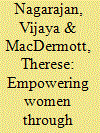

|
|
|
|
|
| Publication |
2013.
|
| Summary/Abstract |
Although the pluralist system of land tenure in Vanuatu does not directly discriminate against women, the operation of the system and contemporary interpretations of custom is increasingly marginalising women from the decision making processes regarding land management and control. Commitment to the principles of gender equality through constitutional guarantees and the ratification of relevant international treaty obligations, while providing a relevant legal framework for equality, have only had limited success in addressing discriminatory practices. This article analyses alternative ways to overcome the barriers faced by women that are currently under consideration in many Pacific island Countries, including recording and registration, as well as legal vehicles such as incorporating customary land groups, trusts and community companies. This article concludes that while both existing and proposed mechanisms have the potential to secure for women a greater role in decision making processes regarding land management and control, that potential will not be realised in the absence of knowledge, empowerment and the acceptance of the legitimacy of such rights
|
|
|
|
|
|
|
|
|
|
|
|
|
|
|
|
| 4 |
ID:
127128
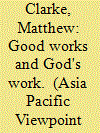

|
|
|
|
|
| Publication |
2013.
|
| Summary/Abstract |
Eighty per cent of the world's population profess religious faith, making religious belief a common human characteristic found in all cultures and societies. Within development studies' literature and practice, religion and faith have been largely ignored or misunderstood. While religious organisations are primarily concerned with providing spiritual leadership, an interest in the physical welfare of their communities is also a core aspect of their existence. Within Vanuatu, an important community space is the church building with a range of community development activities taking place within it. This case study considers how community development activities are incorporated into the daily ministries of Christian Churches in Vanuatu, including the use of church buildings as the location for these activities.
|
|
|
|
|
|
|
|
|
|
|
|
|
|
|
|
| 5 |
ID:
176485
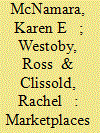

|
|
|
|
|
| Summary/Abstract |
Faced with the pressing challenges of poverty, climate change and disasters, identifying opportunities for interventions that offer positive outcomes across the trifecta of development, adaptation and disaster risk reduction is critically needed. While the overlaps between these streams can be straightforward in theory, practical opportunities for convergence are often lacking. Drawing on 10 focus groups with women market vendors who are part of the UN Women's Markets for Change programme in Vanuatu, this paper explores how markets as places can be useful entry points for this trifecta. Marketplaces can be important sites for developing capabilities and empowering women. As transient and interactive spaces, marketplaces also have inherent strengths that can be built upon and utilised to heighten intervention reach and foster positive outcomes across the development‐adaptation‐disaster trifecta. This paper encourages further exploration into the capacity of marketplaces to achieve this trifecta of outcomes across various scales and locations, and to find solutions to existing challenges.
|
|
|
|
|
|
|
|
|
|
|
|
|
|
|
|
| 6 |
ID:
140239


|
|
|
|
|
| Summary/Abstract |
Migration is increasingly being promoted as a possible adaptive response to risks associated with climate change and other stresses. While migration may present an adaptation pathway in certain contexts, existing research fails to consider the ways in which migration could contribute to vulnerability in sending communities. This paper examines the impact of migration-affected change on local vulnerability in Lamen Bay, Vanuatu. Qualitative methods, including interviews and focus groups with 58 individuals, were used to determine how migration interacts with the multiple stressors faced by the community. The results show that migration is likely to contribute to vulnerability in already vulnerable communities. In Lamen Bay, migration affects a number of contextual factors that influence exposure and the capacity to respond to change, including labour supply, food security, migrant attitudes, underdevelopment and institutional viability. These results suggest that development policy in Vanuatu needs to address existing vulnerabilities while offering the opportunity to migrate.
|
|
|
|
|
|
|
|
|
|
|
|
|
|
|
|
| 7 |
ID:
175363
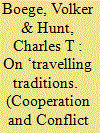

|
|
|
|
|
| Summary/Abstract |
Important sources of everyday security – variously labelled as customary, informal, traditional or autochthonous – are commonly associated with rural spaces and attributed to the lack of presence or traction of state institutions. However, these practices are not limited to peripheries; they can travel. Their structures, authority and legitimacy can be re-produced in new settings, often in response to the perturbations caused by conflict, while also changing in the course of travel. Consequently, in urban spaces – the supposed ‘centre’ of the modern state – people’s sense of security can be profoundly influenced and shaped by the ordering logics of such ‘travelling traditions’. This has ramifications for ‘emplaced security’ – both short-term responses to acute vulnerability of displaced communities and emergent longer-term forms of order. This article explores the utility of the ‘spatial turn’ in peacebuilding theory for better understanding this phenomenon. It uses the cases of Vanuatu and Liberia to demonstrate how more nuanced understandings of the (re)construction of authority between and across places and scales may help comprehend how people generate everyday emplaced security. A spatial approach provides analytical leverage that can help to highlight how a phenomenon such as travelling traditions contributes to the formation and substance of emplaced security.
|
|
|
|
|
|
|
|
|
|
|
|
|
|
|
|
| 8 |
ID:
182267
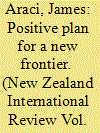

|
|
|
|
|
| Summary/Abstract |
The development of space technology has both provided a base to study the universe and improved the information we have about the Earth, aiding our daily lives. Both the United Kingdom's Integrated Review and new National Space Strategy represent significant shifts in our nation's strategic outlook and recognise the increasing role that technological innovation plays in our lives, the South Pacific and worldwide. Recent British space initiatives in the South Pacific region and our multilateral efforts to promote the responsible use of space illustrate the approach favoured by the United Kingdom. Space is emerging as a new paradigm for international engagement.
|
|
|
|
|
|
|
|
|
|
|
|
|
|
|
|
| 9 |
ID:
123129
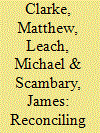

|
|
|
|
|
| Publication |
2013.
|
| Summary/Abstract |
Nation-building remains a key challenge in Vanuatu. From the origins of this new nation in 1980, it was clear that creating a unifying sense of national identity and political community from multiple languages and diverse traditional cultures would be difficult. This paper presents new survey and focus group data on attitudes to national identity among tertiary students in Vanuatu. The survey identifies areas of common attitudes towards nationalism and national identity, shared by both Anglophone and Francophone Ni-Vanuatu. However, despite the weakening ties between language of education and political affiliation over recent years, the findings suggest that there remain some key areas of strong association between socio-linguistic background, and attitudes to the nation, and national identity. These findings cast new light on the attitudes of likely future elites towards regional, ethnic, intergenerational and linguistic fault lines in Vanuatu and the challenges of building a cohesive sense of political community and national identity.
|
|
|
|
|
|
|
|
|
|
|
|
|
|
|
|
|
|
|
|
|